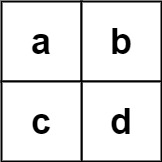212. Word Search II

Description
Given an m x n board of characters and a list of strings words, return all words on the board.
Each word must be constructed from letters of sequentially adjacent cells, where adjacent cells are horizontally or vertically neighboring. The same letter cell may not be used more than once in a word.
Example 1:

Input: board = [["o","a","a","n"],["e","t","a","e"],["i","h","k","r"],["i","f","l","v"]], words = ["oath","pea","eat","rain"] Output: ["eat","oath"]
Example 2:

Input: board = [["a","b"],["c","d"]], words = ["abcb"] Output: []
Constraints:
m == board.lengthn == board[i].length1 <= m, n <= 12board[i][j]is a lowercase English letter.1 <= words.length <= 3 * 1041 <= words[i].length <= 10words[i]consists of lowercase English letters.- All the strings of
wordsare unique.
Solution
word-search-ii.py
class TrieNode:
def __init__(self):
self.hasWord = False
self.children = collections.defaultdict(TrieNode)
def hasEdge(self, char: str) -> bool:
return char in self.children
def get(self, char):
return self.children[char]
class Trie:
def __init__(self):
self.root = TrieNode()
def insert(self, word: str) -> None:
curr = self.root
for w in word:
curr = curr.children[w]
curr.hasWord = True
class Solution:
def findWords(self, board: List[List[str]], words: List[str]) -> List[str]:
rows, cols = len(board), len(board[0])
trie = Trie()
res = set()
visited = set()
for word in words:
trie.insert(word)
def go(x, y, curr, node):
if node.hasWord:
res.add(curr)
for dx, dy in [(x + 1, y), (x - 1, y), (x, y + 1), (x, y - 1)]:
if 0 <= dx < rows and 0 <= dy < cols and (dx, dy) not in visited and node.hasEdge(board[dx][dy]):
visited.add((dx, dy))
go(dx, dy, curr + board[dx][dy], node.get(board[dx][dy]))
visited.remove((dx, dy))
for x in range(rows):
for y in range(cols):
if trie.root.hasEdge(board[x][y]):
visited.add((x, y))
go(x, y, board[x][y], trie.root.get(board[x][y]))
visited.remove((x, y))
return list(res)
word-search-ii.cpp
class Solution {
struct TrieNode {
TrieNode *children[26];
string word;
TrieNode() : word("") {
for (int i = 0; i < 26; i++) {
children[i] = nullptr;
}
}
};
public:
vector<string> findWords(vector<vector<char>> &board, vector<string> &words) {
TrieNode *root = buildTrie(words);
vector<string> result;
for (int i = 0; i < board.size(); i++) {
for (int j = 0; j < board[0].size(); j++) {
dfs(board, i, j, root, result);
}
}
return result;
}
/** Inserts a word into the trie. */
TrieNode *buildTrie(vector<string> &words) {
TrieNode *root = new TrieNode();
for (int j = 0; j < words.size(); j++) {
string word = words[j];
TrieNode *curr = root;
for (int i = 0; i < word.length(); i++) {
char c = word[i] - 'a';
if (curr->children[c] == nullptr) {
curr->children[c] = new TrieNode();
}
curr = curr->children[c];
}
curr->word = word;
}
return root;
}
void dfs(vector<vector<char>> &board, int i, int j, TrieNode *p, vector<string> &result) {
char c = board[i][j];
if (c == '#' || !p->children[c - 'a']) return;
p = p->children[c - 'a'];
if (p->word.size() > 0) {
result.push_back(p->word);
p->word = "";
}
board[i][j] = '#';
if (i > 0) dfs(board, i - 1, j, p, result);
if (j > 0) dfs(board, i, j - 1, p, result);
if (i < board.size() - 1) dfs(board, i + 1, j, p, result);
if (j < board[0].size() - 1) dfs(board, i, j + 1, p, result);
board[i][j] = c;
}
};